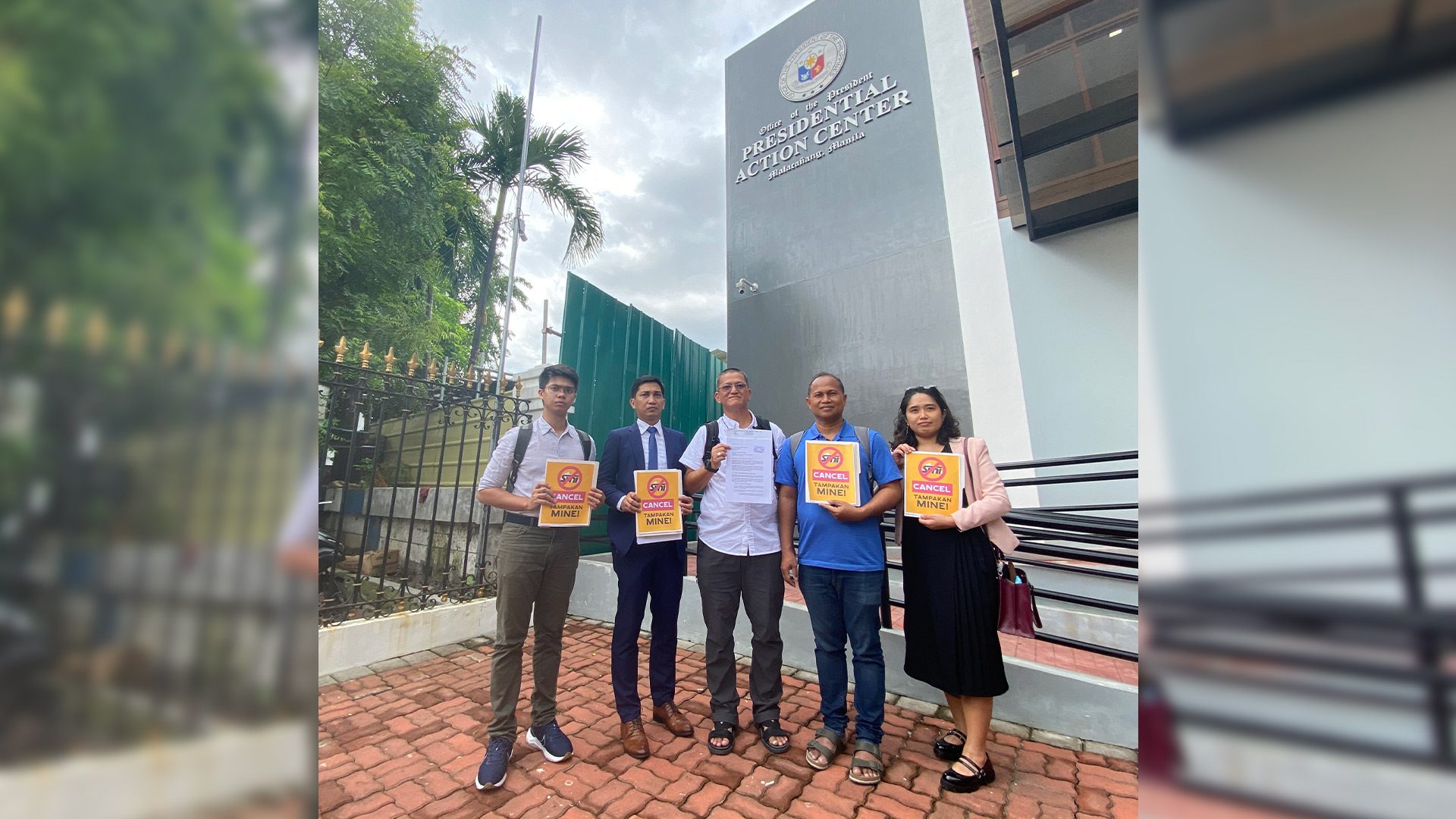Oct 11, 2023 6:31 PM PHT
Iya Gozum

The prelates argue that the extension of the agreement with Sagittarius Mines, the developer behind the Tampakan copper-gold mining project, was unconstitutional
MANILA, Philippines – Bishops from Mindanao urged President Ferdinand Marcos Jr. to cancel the extension of the agreement granted Sagittarius Mines Incorporated (SMI) to develop the Tampakan copper-gold site, projected to be the Philippines’ biggest mining project.
In one of the petition letters submitted to the Presidential Action Center on Wednesday, October 11, bishops from Cotabato, Digos, Kidapawan, and Marbel argued that the 12-year extension of the Financial or Technical Assistance Agreement (FTAA) by the Mines and Geosciences Bureau (MGB) was unconstitutional and thus should be cancelled.
“We respectfully reiterate our demand to cancel the illegal extension of the FTAA-002 in favor of the Sagitarrius Mines Incorporated,” the petition letter of the bishops read.
The bishops argued that only the Philippine president can enter into a FTAA, given the scope of the project. That the MGB alone extended the contract back in 2016 was “illegal.”
Other Stories
[OPINION] Just transition for energy minerals is critical for the Philippines The Philippines hosts the fifth largest mineral reserves globally, with potentially $1 trillion in untapped reserves
Gina Lopez: I really don’t like Tampakan open-pit mine at all Environment Secretary Gina Lopez says she will review permits given to the $5.9-billion mining project of Sagittarius Mines Incorporated in South Cotabato
Philippines removes last hurdle for stalled Tampakan copper-gold project South Cotabato's local legislative body has voted to lift the provincial ban, says Mines and Geosciences Bureau Director Wilfredo Moncano
Bishop Cerilou Casicas of the Diocese of Marbel said on Wednesday, “We respectfully believe that the extension of the FTAA [goes] beyond the powers of the MGB and the same must be declared void, especially as the mining operations will impact on critical environmental areas.”
The prelates cited the Supreme Court ruling where the joint marine seismic undertaking between the Philippine National Oil Company and China National Offshore Oil Corporation and Vietnam Oil and Gas Corporation was declared unconstitutional because it lacked the signature of the president and did not have a Congressional report 30 days after the agreement was made.
In a separate letter, Casicas wrote that the protection of their province from the environmental and social impacts of open-pit mining operations is their “Christian duty and responsibility.”
“The Tampakan mining project poses a threat to the environment of our region, which serves as the food basket of Mindanao,” wrote Casicas.
The copper-gold mining site in Tampakan, South Cotabato, covers around 10,000 hectares. The project would span provinces in Soccsksargen and Davao del Sur, under the jurisdiction of four municipalities and nine barangays.
According to SMI, the area is expected to yield “an average of 375,000 tonnes per annum of copper and 360,000 ounces per annum of gold in concentrate over the 17 year period of mining and ore production.”  PROJECT AREA. The map shows the scope of the Tampakan copper-gold mining project straddling four provinces in Mindanao. Map from SMI’s 2011 environmental impact assessment
PROJECT AREA. The map shows the scope of the Tampakan copper-gold mining project straddling four provinces in Mindanao. Map from SMI’s 2011 environmental impact assessment
The bishop from Marbel said that while Marcos’ rhetoric on climate change and the environment are noteworthy, officials around the president may have conflicting interests.
“He’s one of the presidents who mentioned climate change, global warming in his rhetoric,” Casicas told Rappler. “But when you look at the people surrounding him especially the Romualdezes, they have big interests in mining.”
Despite this, Casicas believed that the mining operations can be stopped at the President’s behest.
“This constitutional power was exclusively lodged to your office, as the President, being the father of the nation, is entrusted to represent the best interests of the Filipino people,” the bishop wrote in his letter.
Casicas was accompanied by a legal counsel from the Legal Rights and Natural Resources Center.
In 1995, the Philippine government entered into a FTAA with Australian mining company Western Mining Corporation (WMC). In its agreement, WMC agreed to expend a minimum capital of $50 million.
WMC eventually sold its rights and interests to SMI in 2001. Last August, SMI president and CEO Roy Deveraturda said the Tampakan project is set to start commercial operations in 2026.
In its website, SMI stated its commitment to uphold the rights of communities affected by the project.
“If developed, the Tampakan project has the potential to make a significant contribution to the economic prosperity of the Philippines and enable a better future for the people of southern Mindanao.
In 2022, the provincial government of South Cotabato overturned its ban on open-pit mining, triggering protests from anti-mining advocates. – Rappler.com
Comments
Post a Comment